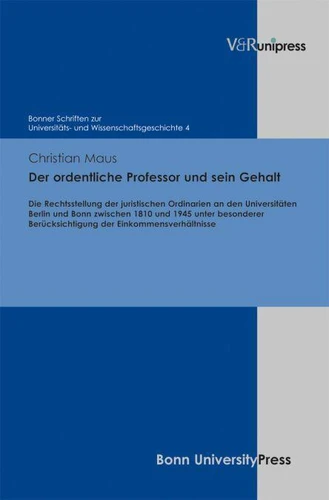Der ordentliche Professor und sein Gehalt. Die Rechtsstellung der juristischen Ordinarien an den Universitäten Berlin und Bonn zwischen 1810 und 1945 unter besonderer Berücksichtigung der Einkommensverhältnisse
Par : , , , ,Formats :
Disponible dans votre compte client Decitre ou Furet du Nord dès validation de votre commande. Le format PDF est :
- Compatible avec une lecture sur My Vivlio (smartphone, tablette, ordinateur)
- Compatible avec une lecture sur liseuses Vivlio
- Pour les liseuses autres que Vivlio, vous devez utiliser le logiciel Adobe Digital Edition. Non compatible avec la lecture sur les liseuses Kindle, Remarkable et Sony
 , qui est-ce ?
, qui est-ce ?Notre partenaire de plateforme de lecture numérique où vous retrouverez l'ensemble de vos ebooks gratuitement
Pour en savoir plus sur nos ebooks, consultez notre aide en ligne ici
- Nombre de pages460
- FormatPDF
- ISBN978-3-8470-0027-3
- EAN9783847000273
- Date de parution03/12/2012
- Protection num.pas de protection
- Taille2 Mo
- Infos supplémentairespdf
- ÉditeurV&R Unipress
Résumé
There is no doubt about the meaning of Wilhelm von Humboldts reform of the Prussian university. It has been imitated throughout the world. But how has it been implemented? For the first time the author associates aspects of educational formation and cultural history with economical facets. In the centre of attention are the earnings of the full professors and especially their so called "Kolleggelder", payments of the students for lectures.
Thereby can be proved how important financial aspects have been for the success of the "Humboldt-System" and how the full professors became an "elite" in the Prussian society. Additionally the author shows how the legal changes at the end of the 19th century have effect on today´s university in germany. On the scale of things the author presents a compendium of the Prussian history of university.
Thereby can be proved how important financial aspects have been for the success of the "Humboldt-System" and how the full professors became an "elite" in the Prussian society. Additionally the author shows how the legal changes at the end of the 19th century have effect on today´s university in germany. On the scale of things the author presents a compendium of the Prussian history of university.
There is no doubt about the meaning of Wilhelm von Humboldts reform of the Prussian university. It has been imitated throughout the world. But how has it been implemented? For the first time the author associates aspects of educational formation and cultural history with economical facets. In the centre of attention are the earnings of the full professors and especially their so called "Kolleggelder", payments of the students for lectures.
Thereby can be proved how important financial aspects have been for the success of the "Humboldt-System" and how the full professors became an "elite" in the Prussian society. Additionally the author shows how the legal changes at the end of the 19th century have effect on today´s university in germany. On the scale of things the author presents a compendium of the Prussian history of university.
Thereby can be proved how important financial aspects have been for the success of the "Humboldt-System" and how the full professors became an "elite" in the Prussian society. Additionally the author shows how the legal changes at the end of the 19th century have effect on today´s university in germany. On the scale of things the author presents a compendium of the Prussian history of university.



